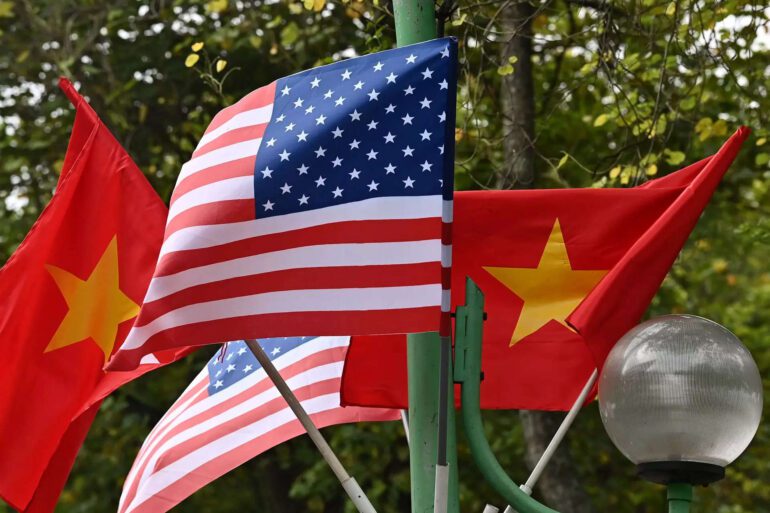TL;DR:
- US strengthens bilateral relations with Vietnam, focusing on AI and aviation.
- Summit between US President Joe Biden and Vietnamese government and industry leaders.
- Cooperation agreements involve key companies like VinFast, Vietnam Airlines, Google, Amkor, Boeing, and Marvell.
- Emphasis on AI, cloud computing, and semiconductors amid US-China tensions.
- Microsoft to develop generative AI product for Vietnam.
- Amkor plans $1.5 billion semiconductor manufacturing plant for AI chips.
- Marvell and Synopsys aim to establish chip design hubs in Vietnam.
- US seeks AI investments in Vietnam due to semiconductor material supply challenges.
- Global race for AI regulation with the US and China taking different approaches.
- Potential impact on the job market analyzed, highlighting opportunities for Web3 smart contract developers.
Main AI News:
In an era defined by the relentless pursuit of technological advancements, the United States and Vietnam have forged a formidable alliance, reaffirming their commitment to bilateral cooperation in vital sectors. The world watches as these two nations transcend geopolitical complexities to embrace a future driven by innovation, particularly in the domains of artificial intelligence (AI) and aviation.
As reported by Reuters, both nations have set their sights on bolstering trade relations, navigating the challenges posed by a tumultuous macroeconomic landscape. The pivotal moment unfolded during a high-level summit, where US President Joe Biden engaged with key Vietnamese government officials and industry leaders, jointly charting a course towards new business frontiers.
Among the luminaries gracing this summit were executives representing prominent Vietnamese enterprises, including electric automobile juggernaut VinFast, aviation stalwart Vietnam Airlines, and digital wallet service provider MoMo. Meanwhile, leading American corporations such as Google (NASDAQ: GOOGL), Amkor, Boeing, and Marvell were equally eager participants, sending senior executives to partake in the discourse.
At the heart of this renewed partnership lies a resolute commitment to “deepen cooperation” in AI, cloud computing, and semiconductors, all in the backdrop of an escalating geopolitical rivalry with China. President Biden succinctly stated, “We’re deepening our cooperation on critical and emerging technologies, particularly around building a more resilient semiconductor chain.”
In a groundbreaking revelation, President Biden unveiled Microsoft’s (NASDAQ: MSFT) ambitious plan to craft a generative AI product exclusively tailored for Vietnam, with a primary focus on enhancing workplace efficiency. This innovation is set to address a notable void in the Vietnamese AI landscape, as generative AI models trained in the Vietnamese language remain conspicuously scarce.
The report also sheds light on Amkor’s grand vision of establishing a state-of-the-art $1.5 billion semiconductor manufacturing facility. Preliminary insights suggest that this facility will specialize in the assembly of AI chips, primarily dedicated to training large language models (LLMs), with operational commencement slated for October.
Not to be outdone, Marvell and Synopsys have unveiled their strategic blueprints to establish chip design hubs throughout Vietnam, underlining their commitment to capturing a significant market share.
The United States finds itself increasingly compelled to invest in AI infrastructure in Vietnam as it relentlessly searches for alternative sources of materials to sustain its semiconductor industry. This pursuit gains urgency following the Chinese government’s imposition of export restrictions on gallium and germanium, rare elements indispensable for AI chip production, in response to the US ban on NVIDIA (NASDAQ: NVDA) for supplying AI hardware to China.
The Global AI Regulatory Race
Amid the frenetic global scramble for AI chips, an underlying race to establish a comprehensive regulatory framework to govern AI technology is taking shape. The United States has initiated talks with leading AI developers to navigate this intricate regulatory landscape, while China has already rolled out its own set of rules for AI firms to adhere to.
In the wake of China’s recent actions, which transpired merely a month ago, more than 70 generative AI tools have surfaced in the country. In contrast, the United States has chosen a measured and deliberate approach, opting for a slow-and-steady trajectory in crafting its regulatory framework.
Despite concerns that AI might adversely impact employment, CertiK, in a recent report, asserted that Web3 smart contract developers may be among the least affected by generative AI tools. This assertion stems from the nascent nature of these technologies and their potential susceptibility to security vulnerabilities.
Conclusion:
The strengthened partnership between the US and Vietnam in AI and aviation signifies a strategic move to tap into emerging markets and secure semiconductor supply chains. This collaboration, while fostering innovation, also reflects the growing importance of AI and technology in geopolitics. The race for AI regulation underscores the need for a structured framework, with differing approaches from the US and China. Overall, this partnership has the potential to reshape the tech landscape and drive economic growth in both nations.

